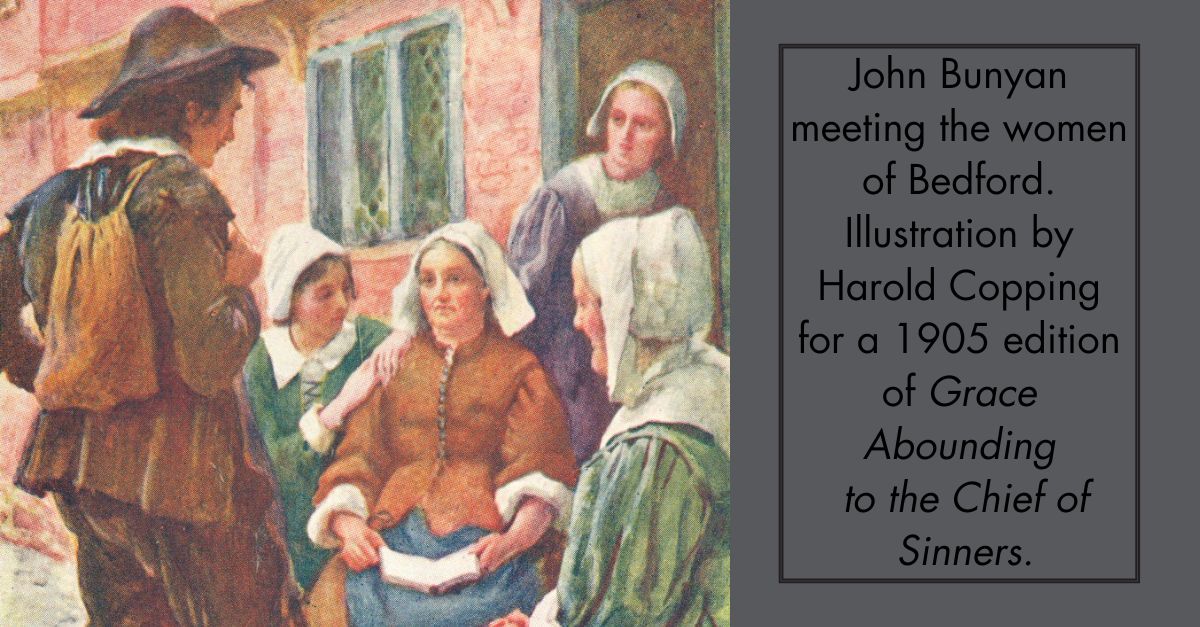John Bunyan and the Pilgrim's Progress
It is hard to fathom that John Bunyan's classic story about a pilgrim's journey from the City of Destruction to the Celestial City is now over 400 years old. That the Pilgrim's Progress still speaks to the modern reader is high praise in its own right. The characters, good and bad that Bunyan describes in the story are the same ones that today's pilgrim meets on his journey. The character Evangelist is still with us, pointing the way to the light. And there is an Obstinate who advises the pilgrim to turn around and head back home, where he will find family, friends, and comfort. "There is a path that seems right to a man that leads to destruction." Surely this is the path that many down through the ages have been tempted to follow.
To seek the Celestial City among the comforts of family and friends cannot be wrong, can it? But Bunyan never allows for the easy path to be taken. In his ears are ringing the Savior's admonition that "everyone who has left houses or brothers or sisters or father or mother or children or fields for my sake will inherit a hundred times as much and will inherit eternal life." (Mt. 19:29) Or, as Bunyan so eloquently put it:
Bunyan was no hypocrite. He walked what he talked and wrote. Bunyan was arrested for holding an illegal religious meeting near his home in Bedford, England, and was sentenced to a three-year jail term in January 1661. However, before he could be released, Bunyan had to assure government authorities that he would not continue to preach illegally. This he could not do, so his prison term continued for another eight years until 1672, and a second stint for six months in 1677.
John Bunyan Jailed for Resisting the Established Church
During John Bunyan's time, many English Christians lived under the tyranny of the established church. At best, this meant that the established church received financial support and favor from the government. At its worst, as during Bunyan's life, it meant the suppression of all religious dissent. Anyone who refused to be a part of the established church (called Nonconformists or Dissenters) was arrested on charges of sedition against the government. This is the situation in which Bunyan found himself‚ unwilling to join the established church that he believed was corrupt, but unable to preach because it was illegal. Like the first disciples, Bunyan chose to follow the higher law and serve God rather than man. For this, he ended up in jail.
Holding fast to his convictions cost Bunyan a great deal. His years in prison forced him to miss out on a normal family life with his wife and children. Because of this, the whole family suffered emotionally and financially. Bunyan reflected on this period of intense trial in his book Grace Abounding to the Chief of Sinners:
The parting with my Wife and poor Children hath oft been to me in this place as the pulling the flesh from my bones; and that not only because I am somewhat too fond of these great mercies, but also because I should have often brought to my mind the many hardships, miseries, and wants that my poor family was like to meet with, should I be taken from them, especially my poor blind Child, who lay nearer my heart than all I had besides.
His reference to his "poor blind Child" is to Mary, the eldest of Bunyan's six children. She became affectionately known as "Blind Mary" within the family. The first few years of his imprisonment, Mary brought him soup for supper every night, though the emotional support that her daily presence gave was worth so much more. Despite many hardships, Bunyan was able to deepen his relationship with God during his years in prison. Years later he was able to reflect positively on these difficult times, "In times of affliction we commonly meet with the sweetest experiences of the love of God."
Prison Could Not Stop His Preaching
Ironically, Bunyan was able to use the ample time in prison to begin a writing ministry that has echoed down the generations to our own time. In 1666, he finished his spiritual biography, Grace Abounding to the Chief of Sinners. Toward the end of his imprisonment, he replied to an issue in Anglican theology with A Defense of the Doctrine of Justification by Faith in Jesus Christ (1672). The world had to wait another six years before the publication of The Pilgrim's Progress in 1678.
A little more than a decade after its publication, there were over 100,000 copies of The Pilgrim's Progress in English alone. This, of course, did not include translations that appeared in French, Dutch, and Welsh. Its lasting popularity has been unique, making it the second most popular book behind the Bible since its release. The story's opening paragraphs reveal its enduring theme:
As I walked through the wilderness of this world, I lighted on a certain place where was a Den, and I laid me down in that place to sleep: and as I slept I dreamed a dream. I dreamed, and behold, I saw a man clothed with rags, standing in a certain place, with his face from his own house, a book in his hand, and a great burden upon his back...Now I saw, upon a time when he was walking in the fields, that he was, as he was wont, reading in his book, and greatly distressed in his mind; and as he read, he burst out, as he had done before, crying, What shall I do to be saved?
Recommended
After Bunyan's final release from jail, the dissenting Christians of Bedford asked him to lead them as their pastor. Bunyan spent his remaining years preaching and writing, always hoping that people everywhere would ask the same question as Pilgrim, "What shall I do to be saved?"
John Bunyan's Thoughts on Freedom and Temptation.
"So I saw in my dream, that just as Christian came up with the cross, his burden loosed from off his shoulders, and fell from off his back, and began to tumble, and so continued to do till it came to the mouth of the sepulcher, where it fell in, and I saw it no more."
"Believe that as sure as you are in the way of God you must meet with temptations."
"Temptations, when we meet them as first, are as the lion that reared upon Samson; but if we overcome them, the next time we see them we shall find a nest of honey within them."
They Found a New World

Bunyan describes what he felt when he heard the poor women describing their faith, pictured left.
"But upon a day the good providence of God did cast me to Bedford to work on my calling, and in one of the streets of that town I came where there were three or four poor women sitting at a door in the sun and talking about the things of God; and being now willing to hear them discourse, I drew near to hear what they said, for I was now a brisk talker also myself in the matters of religion. But now I may say I heard, but I understood not; for they were far above, out of my reach; for their talk was about a new faith; for their talk was about a new birth‚--the work of God on their hearts. And methought the spake as if Joy did make them speak; they spake with such pleasantness of scripture language and with such appearance of grace in all they said, that they were to me as if they had found a new world."
Bunyan's Words of Wisdom
"Then I saw that there was a way to Hell, even from the gates of heaven."
"They who will have Heaven must run for it because the devil, the law, sin, death, and hell are following them. There is never a poor soul that goes to Heaven where the devil, the law, sin, death, and hell do not chase after it‚--and I assure you the devil is nimble; he can run very quickly; he is light on his feet and has overtaken many; he has knocked them down and has given them an everlasting fall."
"If we have not quiet in our minds, outward comfort will do no more for us than a golden slipper on a gouty foot."
"He who runs from God in the morning will scarcely find him the rest of the day."
"A saint abroad, and a devil at home."
"Take heed of the flatteries of false brethren."
"It is said that in some countries trees will grow, but will bear no fruit because there is no winter there."
"I never know a thing well till it is burned into my heart by prayer."
"The best prayers have more often groans than words."
"A man there was,
though some did count him mad,
The more [money] he cast [gave] away
the more he had."
"Pray often, for prayer is a shield to the soul, a sacrifice to God, and a scourge to Satan. Prayer will cease a man from sin; or sin will cease a man from prayer."
("John Bunyan: Mender of Pilgrim Souls" by Joe Thomas, PhD, published on Christianity.com on April 28, 2010)
Photo Credit: © Getty Images/Volodymyr Zakharov
This article is part of our larger Inspiring Quotes resource meant to encourage and strengthen your faith. Visit our most popular quotes by well known Christians and theologians to find more inspiration. Remember, the Holy Spirit can work through us when we have faith and share it with others! Please pass along any quotes that touch your heart because you never know light you’ll shine on someone else’s dark day!
Dr Martin Luther King Jr Quotes
Dietrich Bonhoeffer Quotes
Charles Spurgeon Quotes
Billy Graham Quotes
Corrie Ten Boom Quotes
C.S. Lewis Quotes
Elisabeth Elliot Quotes
Mother Teresa Quotes









